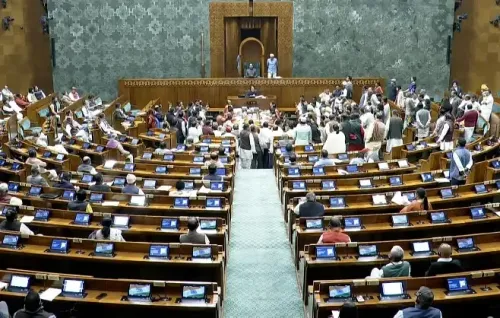Tamil Nadu Government to Convene Fishermen for Final Coastal Zone Management Plan Discussions

Synopsis
Key Takeaways
- Consultative meetings with fishermen associations planned.
- Concerns raised about omitted ecological zones in the CZMP.
- Revised draft submitted by NCCR to TNSCZMA.
- Legal challenges from fishermen regarding the 2022 draft.
- NGT directed ground verification of sensitive areas.
Chennai, March 10 (NationPress) The Tamil Nadu Environment Department is set to conduct consultative meetings with representatives from various fishermen associations throughout the state to review the final draft of the Coastal Zone Management Plan (CZMP).
The National Centre for Coastal Research (NCCR) has revised the CZMP on behalf of the Tamil Nadu State Coastal Zone Management Authority (TNSCZMA) following significant opposition from the fishing community.
Fisherfolk expressed concerns regarding the 2022 draft plan, stating that it omitted critical ecological zones such as salt pans, water bodies, backwaters, and other sensitive areas.
Sources within the Tamil Nadu Environment Ministry indicate that the NCCR has presented the revised final draft to the TNSCZMA in a recent meeting.
Supriya Sahu, Secretary of the Environment, Climate Change, and Forest Department, who is also the Chairperson of TNSCZMA, has directed the Fisheries Department to organize a pre-consultation meeting with representatives from various fishermen's associations across all coastal districts.
It is noteworthy that several legal challenges were raised when the 2022 draft CZMP was released, with petitioners urging the tribunal to mandate the TNSCZMA to utilize the 1996 CZMP as the base map for the 2019 plan instead of the 1997 CZMP, which allegedly resulted in the exclusion of essential ecological areas.
The NGT acknowledged these issues and ordered the Tamil Nadu government to develop the 2019 CZMP using the 1996 base map.
However, petitioners claimed that the TNSCZMA did not adhere to this directive.
Fishermen’s organizations have also contested the draft land-use maps, asserting that they inadequately delineate crucial areas such as fishermen’s habitations and designated fishing zones.
Some petitions highlighted that parts of existing water bodies were not represented in the draft maps, rendering them incomplete and inaccurate.
In light of these concerns, the NGT directed the TNSCZMA to perform ground verification of ecologically sensitive areas as needed or where specific issues were raised.
The tribunal also instructed the authority to comply with High Court orders and incorporate feedback from District Collectors.
As a result of these findings, the draft CZMP must be amended, updated, and corrected prior to its final version being made available for public consultation.
Antony John, leader of a Tamil Nadu fishermen’s association, expressed support for the government’s initiative to engage in discussions with fishing communities concerning the CZMP.
“We commend the Tamil Nadu Environment Department’s effort to consult with fisherfolk before finalizing the Coastal Zone Management Plan,” he stated to IANS.
The upcoming consultative meetings are anticipated to significantly address the fishing community's concerns while promoting a sustainable and ecologically responsible coastal management strategy.










